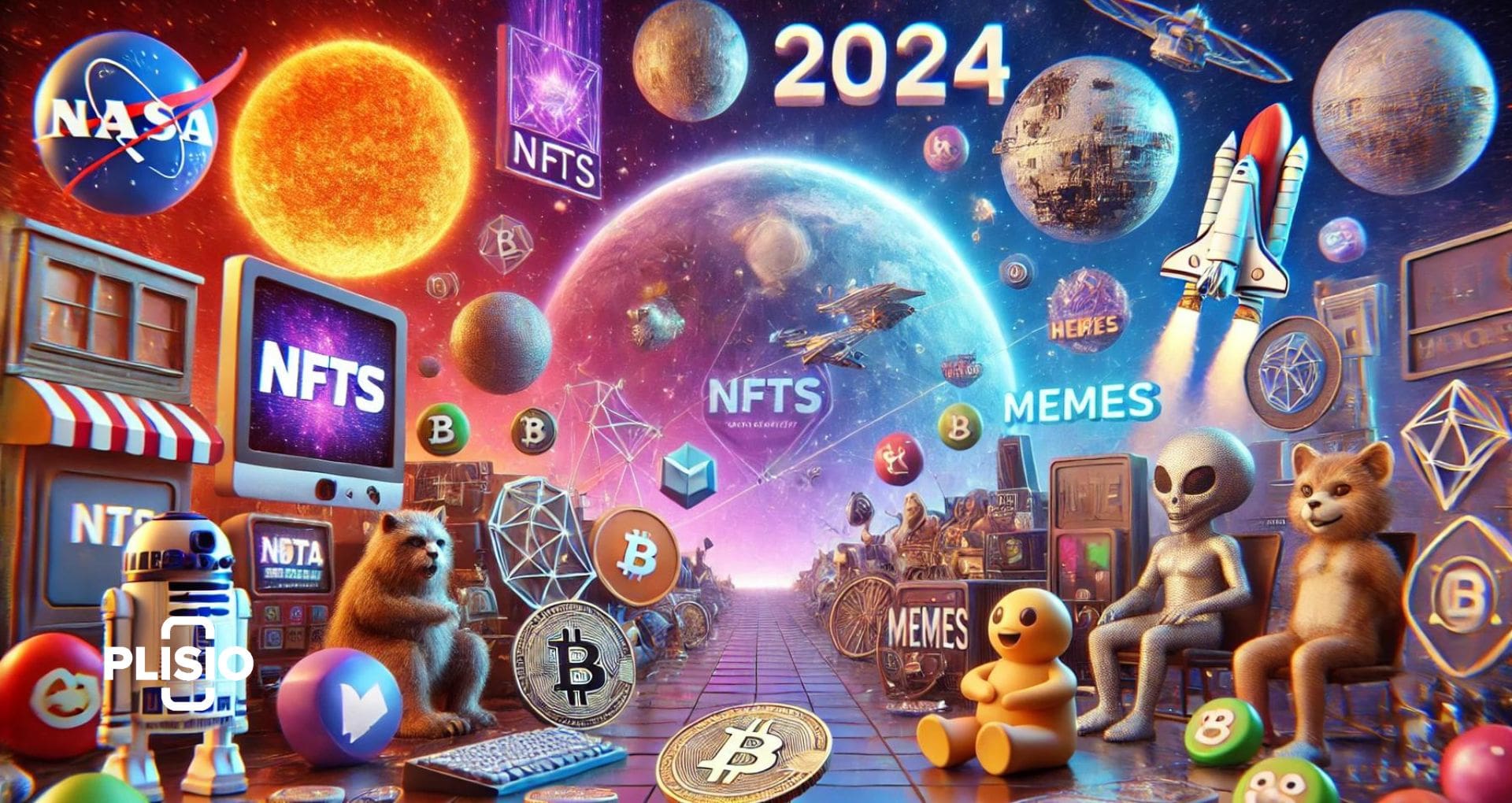NFTs in 2024: Your Guide to Profit

The digital art and collectibles sector has undergone a transformative shift with the advent of non-fungible tokens (NFTs). Today, the crypto market boasts a vibrant array of over 300 promising NFT startups. Whether you're an artist looking to showcase your digital creations, a collector on the hunt for unique pieces, or an investor aiming to capitalize on digital assets, the NFT domain offers myriad ways to potentially build wealth.
In this blog post, we explore six strategic approaches to profiting from NFTs in 2024. From crafting and marketing your own digital masterpieces to investing in expansive virtual real estate, these strategies are tailored to guide you through the evolving NFT marketplace and help you achieve substantial financial gains. Stay tuned as we delve into each method, providing insights and tips on how to maximize your investment in the world of NFTs.
Making Money with NFTs: The Top Strategies for Success with Non-Fungible Tokens
- Trading on Secondary Markets: Platforms like OpenSea and Nifty Gateway offer vibrant marketplaces for trading NFTs. To succeed, monitor market trends diligently to purchase at low prices and sell when values peak.
- Generating Passive Income through NFT Staking: Engage in NFT staking on platforms like Unifty or NFT20 to earn rewards, typically paid out in cryptocurrencies. This method provides a steady income stream without the need for active trading.
- Creating and Selling Digital Art: For creatives, the NFT space is revolutionary. Artists can tokenize their work—be it images, videos, music, or 3D models—and list them on marketplaces such as OpenSea and Rarible to reach global audiences.
- Investing in Notable NFT Collections: Some investors focus on acquiring NFTs from high-demand collections like CryptoPunks or Bored Ape Yacht Club, with plans to sell them for a profit as their market value increases.
- Participating in NFT Games: Dedicate time to playing NFT-based games where you can earn in-game assets to sell at a profit. This approach blends entertainment with potential financial gains.
- Investing in Virtual Real Estate and Metaverse Assets: The metaverse offers a new frontier for real estate, where buying and developing virtual land on platforms like Decentraland or The Sandbox can lead to significant profits as these virtual spaces grow in popularity and utility.
Each of these methods requires a different level of investment and involvement but presents unique opportunities to engage with the digital economy and potentially reap substantial rewards.
What are NFTs and why are they so valuable?
Non-Fungible Tokens (NFTs) can be likened to unique works of art, rare collectibles, and other irreplaceable items. Much like an original Picasso, which is singular and cannot be duplicated even by an identical copy, NFTs are inherently unique. Although primarily associated with digital assets, NFTs can represent ownership of both physical and digital items.
NFT creators transform digital works into exclusive collector’s items and tradable assets. Purchasing an NFT doesn't transfer the physical piece itself but rather the rights of ownership, verified through digital tokens. These tokens are primarily hosted on the Ethereum blockchain, allowing anyone to verify the current owner and transaction history of an NFT. Acting as digital certificates of authenticity, NFTs ensure that the digital asset they represent remains unique and secure against forgery, thereby establishing their value.
While it is relatively rare for NFTs to be sold for millions of dollars, they do create significant opportunities. They enable artists to monetize digital art in ways previously unavailable, allowing collectors, investors, and auction houses to engage in a new, dynamic market of digital commerce. This digitalization of ownership is reshaping the art and collectibles market, making it more accessible and broadening the scope for creators and collectors alike.
Produce and Sell NFTs from Your Original Art
Engaging directly in the NFT market by creating and selling your digital works is a prominent method for artists and content creators to earn. By tokenizing your creations, you transform them into unique, tradeable assets on the blockchain, each with its own distinct digital identity.
Getting Started with Creating NFTs for Profit:
- Choose Your Medium: NFTs can encapsulate a diverse array of digital media. This includes everything from traditional images and videos to music tracks, 3D models, and even immersive virtual reality experiences. Select the medium that resonates most with your skills and passion.
- Develop Your Digital Asset: Dedicate time to perfect your creation. The goal is to make it both unique and visually compelling, ensuring it stands out to potential collectors and investors.
- Pick an NFT Marketplace: Numerous platforms are available for minting and listing NFTs, including OpenSea, Rarible, and Foundation. Evaluate each platform considering factors like transaction fees, audience reach, and blockchain compatibility to find your best fit.
- Mint Your NFT: Follow the chosen platform’s instructions to mint your NFT. This process involves uploading your digital artwork and creating a blockchain-based token that represents your art.
- List Your NFT for Sale: Decide on your selling strategy—whether setting a fixed price or launching an auction. Price your NFT appropriately based on its uniqueness and potential demand.
- License Your Artwork: Establish licensing terms to earn royalties each time your NFT changes hands. This approach can provide a sustainable revenue stream, augmenting earnings from the initial sale.
Invest in Elite NFT Collections
If creating NFTs isn't your preferred route, consider another profitable approach: investing in digital collectibles and art. This strategy involves buying non-fungible tokens from renowned or emerging series, aiming to sell them later at a higher price. Prestigious NFT collections such as CryptoPunks, Bored Ape Yacht Club, and World of Women exemplify successful investments in this space.
Steps to Get Started with NFT Collection Investments:
- Research the Market: Stay informed about popular and emerging NFT collections. Regularly visit NFT marketplaces, follow relevant social media accounts, and keep up with industry news to spot trends and potentially lucrative opportunities.
- Evaluate Rarity and Value: Analyze the rarity of items within a collection by considering aspects like edition size, artist reputation, and distinctive features. Typically, the rarer an NFT, the greater its potential value.
- Establish a Budget: Decide how much you are willing to allocate to NFT investments and adhere to this budget. It's important to remember that the NFT market can be volatile, and returns are not guaranteed.
- Make Purchases: Once you find a collection that matches your investment criteria and interests, acquire NFTs from reputable marketplaces.
- Monitor Market Trends: Keep an eye on the fluctuating values of your NFTs and stay updated on developments within the collections you've invested in. Sell your NFTs when the market conditions are favorable to maximize profits.
Monetizing NFTs from Gaming: Turning Play into Profit
Playing NFT games offers more than entertainment—it opens up lucrative opportunities to earn and sell valuable digital assets. These games reward players with unique items ranging from special characters and equipment to exclusive artworks, all of which can be sold for real money.
Steps to Profit from NFTs Acquired in Games:
- Identify High-Value NFTs: As you engage with the game, keep an eye out for rare or in-demand items. These might include limited edition characters or unique in-game artifacts. The rarity and demand of an item usually increase its market value.
- Smart Trading and Flipping: Look for NFTs that are undervalued within the game's economy. Purchasing these at lower prices and reselling them at a premium—known as 'flipping'—can yield significant profits. This strategy requires a solid understanding of the game's market dynamics and player preferences.
- Transfer NFTs to a Suitable Marketplace: After acquiring desirable NFTs, transfer them to an external marketplace that supports their underlying blockchain. Popular platforms for this include OpenSea, Rarible, and Foundation, each offering different audiences and benefits.
- Effectively List Your NFTs: Once on a marketplace, you can list your NFTs for sale either at a fixed price or through an auction. Highlight the exclusivity and potential investment value of each NFT to attract buyers.
- Monitor Market Trends: The NFT market is notably volatile, with values changing rapidly. Keep a close watch on these fluctuations and industry trends to time your sales for maximum profit.
Profit from Trading NFTs on Secondary Markets
Trading NFTs on secondary markets offers a dynamic way to capitalize on the booming digital asset industry. These platforms facilitate the buying and selling of previously owned NFTs, where prices vary based on factors like demand, rarity, and market sentiment. Prominent examples of such platforms include OpenSea and Nifty Gateway, which are popular hubs for NFT enthusiasts.
Steps to Start Trading NFTs on Secondary Markets:
- Register on a Platform: First, choose a reputable secondary market platform for NFTs. Create your account and link your cryptocurrency wallet to enable transactions.
- Conduct Market Research: Dive deep into the market dynamics of the platform. Analyze trends, track price movements, and study popular NFTs to identify profitable trading opportunities.
- Strategic Buying and Selling: Implement the classic investment strategy of buying low and selling high. Look for NFTs that are currently undervalued or have potential for appreciation. Factors to consider include the artist's popularity, the uniqueness of the NFT, and its historical price performance.
- Monitor and Manage Your Investments: Keep a close eye on how your NFTs are performing in the market. Regularly update yourself with the latest news and trends in the NFT space to make timely and informed selling decisions.
Generating Passive Income with NFT Staking
Staking NFTs offers a passive income stream by locking your digital assets in a smart contract to earn rewards, generally in the form of the platform's native cryptocurrency. This method capitalizes on the growing utility of NFTs beyond mere collectibility.
Steps to Begin Earning Through NFT Staking:
- Select a Staking Platform: Start by researching and selecting a reliable NFT staking platform. Consider key factors like the types of NFTs supported, the attractiveness of staking rewards, and the platform’s overall security and reputation. Some notable platforms in this space include Unifty, NFT20, and Muse.
- Stake Your NFTs: Follow the selected platform’s instructions to stake your NFTs. This process involves locking your NFTs into a smart contract for a predetermined duration, during which you cannot sell or transfer the NFT.
- Accumulate Rewards: While your NFTs are staked, you'll earn periodic rewards based on the terms set by the platform. These rewards are usually dispensed in the platform’s cryptocurrency but may include other forms of incentives such as additional digital assets or exclusive access to new NFT drops.
- Unstake and Manage Your Assets: After the staking period ends, you can retrieve your NFTs. You then have the option to restake them, hold onto them for potential value appreciation, or sell them on the market depending on your investment strategy.
Important Considerations and Risks:
- Be cautious of the risks involved in staking, which can include smart contract flaws leading to security breaches, and the potential for the NFTs' market value to decrease during the staking period. Thoroughly evaluate the platform's security measures and the historical performance of similar NFTs before committing your assets.
- Monitor market trends and the platform’s health regularly. Being proactive in this regard can help you make informed decisions about when to stake or unstake, and how to manage your digital assets effectively.
By engaging in NFT staking, you leverage your digital assets to generate passive income while still retaining ownership, making it an appealing strategy for NFT investors looking to maximize their returns with minimal effort.
Capitalizing on Virtual Land and Metaverse Assets
The rapid expansion of the metaverse offers intriguing new avenues for generating income through NFTs by investing in virtual land and assets. Virtual land represents designated digital spaces within metaverse platforms where users can buy, develop, and sell or rent out their virtual properties. Prominent examples of such platforms include Decentraland, The Sandbox, and Somnium Space.
Steps to Begin Investing in Virtual Land and Metaverse Assets:
- Select a Metaverse Platform: Conduct thorough research on various metaverse platforms to choose one that suits your investment objectives and personal interests. Evaluate factors like the size and engagement level of the user base, the platform’s development capabilities, and overall market activity.
- Acquire Virtual Land: Purchase parcels of virtual land through the platform’s marketplace. Transactions typically require the platform’s native cryptocurrency or other supported digital currencies.
- Develop Your Property: Enhance the value of your virtual land by developing it with structures, interactive experiences, or other innovative assets. Well-developed properties can attract more users and create multiple revenue streams, such as through in-world transactions, events, or advertising.
- Rent or Sell Your Land: Depending on your investment strategy, you can opt to rent out your virtual property for a steady income or sell it at a profit if its value increases due to development and rising demand in the metaverse.
Exploring Alternative Ways to Earn Money from NFTs
Beyond the common strategies already discussed, there are several innovative and lesser-known methods to generate income with NFTs. These options tap into the versatility and unique properties of digital tokens.
- NFT Rentals: Much like physical assets, digital assets can be rented out. This is particularly viable in gaming and virtual reality environments, where users can rent NFTs that provide access to special game levels or exclusive virtual events. Renting out high-value or utility-based NFTs can be a steady source of income.
- Fractional Ownership: High-cost NFTs can be divided into smaller, more affordable segments. This allows multiple investors to own a piece of an NFT, making it accessible to a broader audience and creating a shared investment opportunity.
- NFT Fundraising and Crowdfunding: Utilize NFTs for fundraising by issuing tokens that represent a stake in a project or venture. This model can attract investors interested in pioneering projects, offering them a tangible asset in the digital realm.
- Creating NFT-Based Experiences: Develop unique digital experiences linked to NFT ownership. For instance, NFTs can grant holders access to virtual meet-and-greets, exclusive online events, or specialized content. This not only adds intrinsic value to the NFT but also enhances its appeal as a collectible or investment.
- NFT Collateralization: NFTs can serve as collateral for securing loans or other financing options. This is particularly useful for NFT owners who require liquidity but prefer not to sell their valuable digital assets outright.
Why Invest in NFTs?
Unlike traditional cryptocurrencies like Bitcoin or Ethereum, NFTs (Non-Fungible Tokens) are unique and cannot be exchanged on a one-for-one basis. This uniqueness and rarity, combined with their growing popularity, make NFTs an appealing asset for both crypto enthusiasts and general investors. Here are the potential benefits and risks associated with NFT investments:
Benefits of Investing in NFTs
Investing in NFTs offers several advantages that attract both experienced digital asset investors and newcomers:
- Digital Ownership: NFTs provide a secure and verifiable way to claim ownership of digital items, enabling the global buying, selling, and trading of unique digital content.
- Potential for High Returns: Some NFTs have yielded extraordinary returns, with highly coveted pieces fetching enormous profits in the resale market.
- Portfolio Diversification: NFTs represent a novel investment avenue, offering an exciting opportunity to diversify investment portfolios beyond traditional assets and cryptocurrencies.
- Support for Artists and Creators: Purchasing NFTs directly benefits artists and creators by providing them with a new revenue stream and greater recognition for their work.
- Access to Exclusive Content: Owning an NFT can grant exclusive access to content, experiences, or virtual spaces within online communities and metaverse platforms, enhancing the value of these digital assets.
Risks of Investing in NFTs
However, potential investors should also be aware of the risks involved in the NFT market:
- Market Volatility: The NFT market is known for its high volatility, with prices capable of significant fluctuations over short periods, potentially leading to both substantial gains and losses.
- Lack of Liquidity: Some NFTs may be hard to sell, especially if they belong to less popular collections or during market downturns, which can impact liquidity.
- Copyright and Intellectual Property Concerns: Issues may arise over the legality of the digital content represented by NFTs, particularly if the original creator did not have the rights to tokenize the assets.
- Fraud and Scams: The burgeoning NFT market has attracted fraudsters and scammers, necessitating vigilance and thorough due diligence before making any investments.
- Environmental Impact: The blockchain technology underlying some NFTs can be highly energy-intensive, raising concerns about the environmental impact of these transactions.
Navigating NFT Investments
Investing in NFTs requires a balanced approach, weighing these benefits against potential risks. For those considering diving into the NFT space, it is crucial to conduct comprehensive research, understand the specific dynamics of the NFT market, and consider the long-term implications of your investment strategy. Engaging with trusted platforms and communities can also provide valuable insights and enhance your investment experience in this innovative digital asset class.
What are the most popular NFT marketplaces?
When delving into the world of Non-Fungible Tokens (NFTs), it's crucial to know where to buy and sell these digital assets. Here's a list of well-known NFT marketplaces, each with its unique features and focus:
- OpenSea: OpenSea is the largest and most comprehensive NFT marketplace, offering a vast array of digital items, including art, collectibles, virtual real estate, and more. It supports multiple blockchains, making it accessible to a broad audience.
- Rarible: Rarible is a democratic marketplace that allows artists and creators to issue and sell NFTs. It operates on a community governance model, where users can vote on changes and proposals using the platform’s native token, RARI.
- Foundation: Foundation is a platform that bridges digital artists and collectors through live auctions. It's known for high-quality digital art and has become a hub for creative and innovative works. Participation as a creator is typically invite-only, ensuring a curated experience.
- Mirror World: This platform focuses on virtual assets and gaming NFTs, providing a specialized marketplace for gamers and developers. Mirror World emphasizes user experience and integration with various gaming ecosystems.




